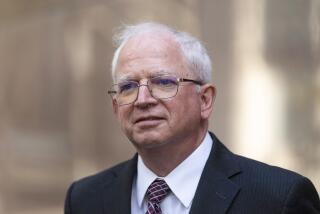Charles Eastman dies at 79; playwright and screenwriter
Charles Eastman, a playwright and screenwriter whose credits included the 1970s films “The All-American Boy” and “Little Fauss and Big Halsy,” has died. He was 79.
Eastman, the brother of the late “Five Easy Pieces” screenwriter Carole Eastman, died July 3 of complications from heart disease at Brotman Medical Center in Culver City, said Dave Schultz, a friend.
A Hollywood native, Eastman began writing in the late 1950s and had several of his plays produced by Los Angeles little theater groups beginning in the early ‘60s.
He launched his screenwriting career in the mid-’60s as an uncredited script doctor on films such as “The Americanization of Emily,” “The Cincinnati Kid” and “This Property Is Condemned.”
A decade later, a Times writer described Eastman during the ‘60s as “a gifted and eccentric writer who turned down offers by major studios and stars to option his original screenplays unless he could direct them himself.”
However, Sidney J. Furie wound up directing Eastman’s original screenplay for “Little Fauss and Big Halsy,” a 1970 movie starring Robert Redford as a motorcycle racer.
“The All-American Boy,” a 1973 film about a promising small-town boxer starring Jon Voight, was Eastman’s first -- and only -- film credit as a director.
His third and final screenwriting credit was “Second-Hand Hearts,” a 1981 film directed by Hal Ashby and starring Robert Blake and Barbara Harris. It was based on Eastman’s one-act play “The Hamster of Happiness,” which aired on “NBC Experiment in Television” in 1968.
Screenwriter Robert Towne, who met Eastman in the ‘60s, recalled how impressed he was by an early Eastman screenplay that never made it to the big screen: “Honeybear,I Think I Love You,” the story of a disturbed young man’s obsession with a girl.
“For me, it was quite a revelation because it was the first contemporary screenplay I had read that just opened up the possibilities of everything that you could put into a screenplay in terms of language and the observations of contemporary life,” Towne said this week.
“It was a stunning piece of work, and I think it influenced a lot of us, even though it wasn’t made,” Towne said. “Everybody tried to get it made, but Charlie was very particular about how it was going to be made, and in some ways I think he kept it from being made.
“Charlie was an original, that’s all. He used language in a way that I hadn’t seen used before.”
Towne said Eastman was “very particular, very quirky, very much like his sister,” who wrote “Five Easy Pieces,” starring Jack Nicholson, under the pen name Adrien Joyce.
“I think she was writing about Charlie in some ways,” said Towne. “Charlie was just one of those shadowy figures that I think cast a longer shadow over most of us than was generally recognized.”
One of four children, Eastman was born Sept. 18, 1929, into a family employed in the movie business: His father was a grip at Warner Bros. and his mother was Bing Crosby’s longtime secretary.
As a young teenager, Eastman acted in little theater. While attending Los Angeles City College, he worked as a film extra and had a stint as a stand-in for Jerry Lewis. He later worked in the script departments of NBC and CBS.
Among Eastman’s plays are “The UnAmerican Cowboy” and “Busy Bee Good Food All Night Delicious.”
He also wrote short stories, including “Yellow Flags,” which was published in Atlantic Monthly and included in the 1993 “O. Henry Prize Stories.”
Since undergoing a quadruple heart bypass several years ago, Eastman wrote three screenplays that so far are unproduced.
“Charlie just sat in front of a computer every day and wrote,” said Schultz. “It was his life.”
Eastman, whose sister died in 2004, had no immediate surviving family members.
A memorial service is planned for August.
More to Read
Start your day right
Sign up for Essential California for the L.A. Times biggest news, features and recommendations in your inbox six days a week.
You may occasionally receive promotional content from the Los Angeles Times.






